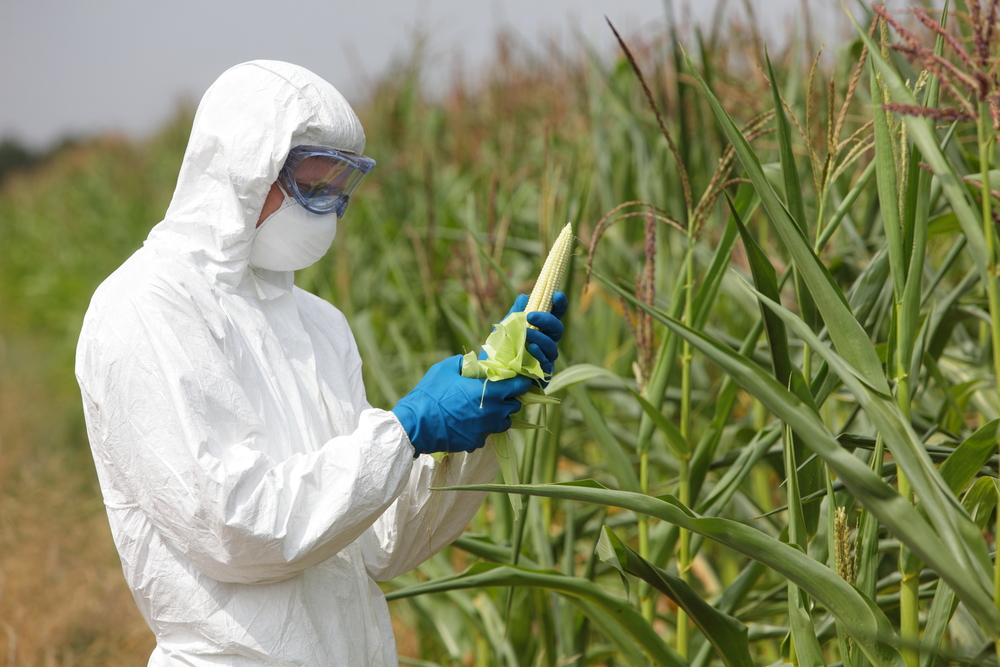Part of the Food Policy Snapshot Series
Policy name: National Bioengineered Food Disclosure Law
Overview: Mandatory compliance with the National Bioengineered Food Disclosure Law began on January 1, 2022. The law requires all foods produced with bioengineered ingredients, also known as genetically modified organisms (GMOs), to be labeled as such.
Location: United States
Population: 334 million
Food policy category: Food production and distribution
Program goals: To help consumers make more informed decisions about what types of foods they purchase and eat.
How it works: Rather than labeling foods as containing “genetically engineered” (GE) ingredients or “genetically modified organisms” (GMOs), these foods will now require a “bioengineered” (BE) disclosure. The disclosure can be displayed in the form of a text, symbol, electronic or digital link, phone number, or web address.
Bioengineered foods are defined as “those that contain detectable genetic material that has been modified through certain lab techniques and cannot be created through conventional breeding or found in nature.” The USDA’s Agricultural Marketing Service has published a List of Bioengineered Foods to inform food manufacturers and retailers about whether they need to make a disclosure on their products.
Progress to date: The National Bioengineered Food Disclosure Law was passed in 2016, and the National Bioengineered Food Disclosure Standard was published on December 21, 2018. Voluntary compliance with the Standard began on January 1, 2020, for large companies, and for small manufacturers on January 1, 2021. Compliance with the Standard became mandatory for all manufacturers on January 1, 2022.
Why it is important: Bioengineered crops might be designed to interact with different types of pesticides (which includes insecticides and herbicides), or have pesticide-producing effects. According to Harvard University’s Science in the News, “Herbicide-tolerant genetically modified (GM) crops have led to an increase in herbicide usage while insecticide-producing GM crops have led to a decrease in insecticides.”
While there is no conclusive evidence of adverse health effects from consuming bioengineered foods, studies suggest there may be serious health risks from prolonged exposure to, and ingestion of, pesticides and weed killers. In addition, some people are simply concerned about potential risks from ingesting GMOs.
Consumers have the right to know what they are putting in their bodies, and labeling bioengineered foods will help disclose that information.
Program/Policy initiated: Compliance became mandatory on January 1, 2022.
Point of contact: N/A
Similar practices: Sixty-four countries, including all of the European Union, Japan, and Australia, currently require labeling of genetically modified foods.
Evaluation: A formal evaluation of the law’s effectiveness has not yet been conducted. However, many are skeptical and do not believe the labels will change purchasing behavior, and others are concerned that the new terminology and labeling will create confusion among consumers and do more harm than good.
Learn more:
- Agricultural GMOs—What We Know and Where Scientists Disagree (Sustainability)
- GMOs – Environmental Concerns (Garden Organic)
- GMO Is Out, ‘Bioengineered’ Is In, As New U.S. Food Labeling Rules Take Effect (National Public Radio)
- A New Age of Evolution: Protecting the Consumer’s Moral and Legal Right to Know through the Clear and Transparent Labeling of All Genetically Modified Foods (Journal of Law and Health)
- New Labels for Bioengineered Foods: What the Public Needs to Know (Rutgers)
- Several European Countries Move to Rule Out GMOs (European Commission)
- The USDA’s New Labeling for Genetically Modified Foods Goes Into Effect Jan. 1. Here’s What You Need to Know. (The Washington Post)
- Webinar: Overview of the National Bioengineered Food Disclosure Standard December 2020 (United States Department of Agriculture)
References:
- 6 Things You Need to Know About the New GMO Food Label (Everyday Health)
- BE Disclosure (United States Department of Agriculture)
- Common Weed Killer Glyphosate Increases Cancer Risk by 41%, Study Says (CNN)
- Exposure to Glyphosate-Based Herbicides and Risk for Non-Hodgkin Lymphoma: A Meta-Analysis and Supporting Evidence (Mutation Research)
- GMOs and Pesticides: Helpful or Harmful? (Harvard University Science in the News)
- GMOs and Your Health (United States Food and Drug Administration)
- GMO Facts (Non-GMO Project)
- GMO Labeling Not Likely to Impact Purchase Decisions, Study Says (Food Dive)
- Health Risks of Genetically Modified Foods (Critical Reviews in Food Science and Nutrition)
- How GMO Crops Impact Our World (United States Food and Drug Administration)
- Human Health Issues Related to Pesticides (United States Environmental Protection Agency)
- National Bioengineered Food Disclosure Standard (United States Congress)
- National Bioengineered Food Disclosure Standard (United States Department of Agriculture)
- National Bioengineered Food Disclosure Standard; Guidance on Validation of a Refining Process and Selecting a Testing Method (Federal Register)
- What is a Bioengineered Food? (United States Department of Agriculture)


